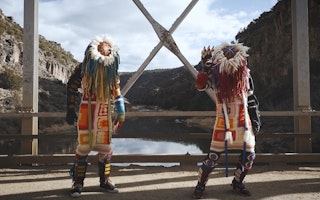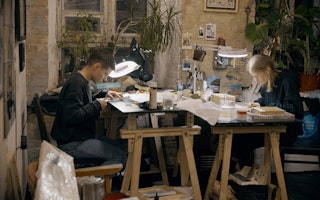Art in a Time of Turmoil: The View from Lebanon
By Rama Halaseh

A year ago this August, a thunderous explosion tore through Beirut, decimating huge swaths of the city while the world looked on in horror. Lebanon was still reeling from the political and economic turmoil that ignited its October 2019 protests and grappling with the further economic fallout from COVID-19 lockdowns when Beirut’s port was set ablaze by the detonation of ammonium nitrate that had been negligently stored there. The resulting conflagration caused hundreds of deaths, thousands of injuries, substantial property damage, and the dislocation of hundreds of thousands left homeless.
Lebanon’s independent arts and culture realm was among the sectors most deeply disrupted by this succession of crises. The country’s capital city has traditionally boasted private galleries, art fairs, film festivals, design studios, and music and book launch events. Its cultural production, a salient facet of its cosmopolitan allure, has struggled to stay afloat. Studios were destroyed or closed, exhibitions cancelled, and artists’ morale deflated. The situation in Lebanon remains precarious—no one has yet been held accountable for the blast—and a persistent power vacuum has clouded the country’s political and economic future.
Where can hope be found amid such bleakness? What would happen to the nation’s heart, without the portrayal and interrogation of our reality through music, art, film, and literature? The Arab Fund for Arts and Culture (AFAC) and Culture Resource (Al-Mawred Al-Thaqafy), Beirut-based organizations and long-time partners of the Open Society Foundations, came together to offer support to Lebanon’s cultural sector—a collaboration that allowed donors and leading cultural organizations to reimagine what solidarity and good governance could potentially look like during a time of turmoil. This partnership also revealed the enormous need for coherent cultural policies and protection measures for artists during crises.
This wasn’t the first time these groups stepped up in an hour of need. In October 2019, in solidarity with the popular uprisings that raged across Lebanon to protest economic stagnation, sectarian rule, and corruption, the two organizations went on strike alongside other members of Lebanon’s cultural community. Maintaining only minimal operations, they joined others on the streets and reimagined what they could contribute to the movement that was demanding real national reforms.
AFAC is an independent regional initiative that offers financial and professional support to cultural practitioners from the Arab world. Culture Resource is a regional organization that supports independent artistic creativity and development of cultural policy in the region. Mindful that no financial or policy support would come from the government to help salvage Lebanon’s arts community, which was ailing under prevailing economic hardships, these groups reflected on ways to help, even as COVID-19 lockdowns in the spring of 2020 added an additional layer of financial strain on Lebanon’s cultural ecosystem.
AFAC and Culture Resource approached donors in early 2020 to create a Lebanon Solidarity Fund aimed at supporting the sector’s survival by providing emergency funds to sustain operations and reframe business models. Through this initiative, backed by Open Society, the Ford Foundation, and the Drosos Foundation, the two organizations were able to support 23 cultural organizations across Lebanon.
They had just announced the grant winners in July 2020 when the explosion of August 4 took place. Some of the grantees of the fund had been in close physical proximity to the blast and suffered injuries or lost homes, studios, or art-making materials.
In the midst of national anguish, AFAC and Culture Resource received heart-warming messages from individuals and organizations inside and outside Lebanon. Groups offered to return grants they had received so that the funds could be regranted to artists severely impacted by the blast. This selflessness epitomized the solidarity that helped the arts community process its grief and find solace among creative peers.
AFAC and Culture Resource launched a second phase of the Lebanon Solidarity Fund in August 2020, this time as an international fundraising campaign. Priority was given to helping individual artists, cultural practitioners, and technicians directly affected by the explosion, whether through physical injury or loss of workspace or equipment. They were able to support 207 people, some of whom had been planning on leaving Lebanon but said the solidarity they witnessed encouraged them to reconsider.
The groups then turned their attention to organizations, including galleries and libraries. They identified three categories of need: reconstruction, institutional support, and programmatic support. They approached cautiously, mindful that people were psychologically strained and at different readiness levels to produce work. With the funds raised in this second stage of the post-explosion support, the groups were able to support 43 cultural institutions and spaces.
One of the first stage performances open to the public after the explosion was held in one of the few theatres currently operating, supported by the Lebanon Solidarity Fund. This moment was a reminder to the Open Society Foundations and other donors of the importance of funders showing solidarity in times of crisis. Solidarity, from a donor perspective, can be best practiced by making sure our partners take the lead in evaluating needs on the ground, designing and prioritizing the interventions needed, and being granted full ownership over the resources available. This fund was a strong testament to the potential of participatory philanthropy as an act of solidarity.
In a nation like Lebanon, deeply divided along sectarian lines, arts and culture are avenues through which to create narratives that remind us of a common heritage. Though often viewed as luxuries in times of crisis, cultural offerings are among the first resources the public turns to in order to weather the storms: music for consolation, films to stir the imagination, art to envision a better tomorrow.
The Lebanon Solidarity Fund serves as a reminder of the need for state and private cultural organizations and their funding partners to pull together to sustain the arts and cultural sectors as a whole. We must not forget the arts in hard times.
Rama Halaseh is a team manager with the Open Society Middle East and North Africa Program.


